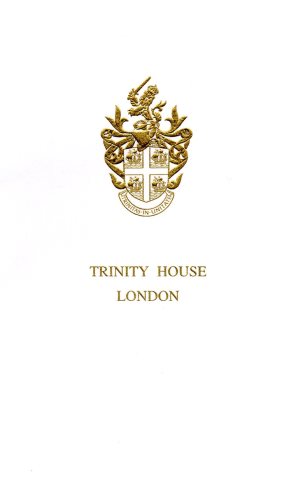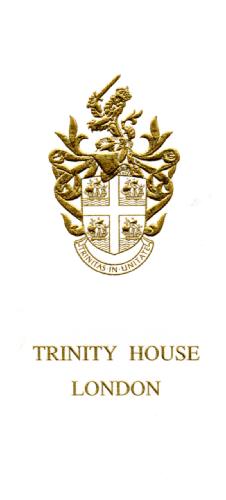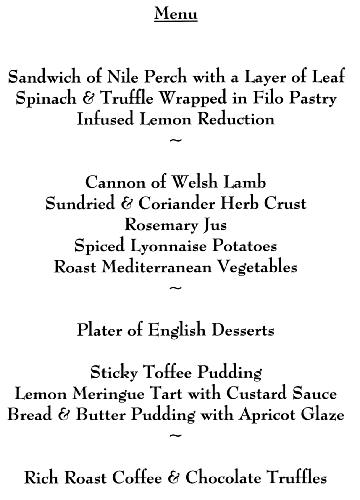
Tel: 020 7620 1818 email: cookandbutler@btconnect.com
Trinity House
www.trinityhouse.co.uk
Elder Brethrens' Guest Night
July 2013



![]()
The Corporation of Trinity House
The Corporation of Trinity House has three main functions: -
1. The General Lighthouse Authority for England, Wales, The Channel Islands and Gibraltar.
2. A Deep Sea Pilotage Authority,
3. A Maritime Charity for the safety, welfare and education of mariners.
Trinity House was constituted under a Royal Charter granted by King Hemy VIII in 1514. The Corporation is managed by a Court of Elder Brethren drawn from senior ranks in the Merchant and Royal Navies and the maritime industry.
Lighthouse Authority
It is responsible for the provision of aids to navigation to assist the safe passage of vessels in general navigation. These comprise nearly 600 facilities ranging from traditional aids such as lighthouses, buoys and beacons, to a satellite based differential global positioning service. Its statutory functions as a General Lighthouse Authority are set out in Part VIII of the UK Merchant Shipping Act 1995.
Trinity House is also responsible for the inspection and auditing of over 10,000 local aids to navigation provided by port and harbour authorities, and those provided on offshore structures, such as production platforms or wind farms. It also has a responsibility for locating and marking wrecks that are a danger to general navigation and arranging for their dispersal to a safe depth. Funding for all these services is raised from light dues which are levied on vessels calling at ports in the United Kingdom and Ireland based on net registered tonnage or registered length in the case of tugs and fishing vessels. The dues are paid into the General Lighthouse Fund which is under the stewardship of the Department for Transport, and are used to finance the lighthouse services provided not only by Trinity House, but also the Northern Lighthouse Board (responsible for the waters of Scotland and the Isle of Man) and the Commissioners of Irish Lights (responsible for the waters of both Northern Ireland and the Republic of Ireland).
Trinity House maintains a small secretariat based at Tower Hill in London. Day-to-day operations are carried out from the main depot and buoy yard at Harwich, the buoy yard in Swansea and an outstation at St. Just (near Penzance).
Trinity House operates three vessels, constantly at sea, maintaining floating aids to navigation, fuelling and mooring light vessels, laying buoys, surveying newly reported shoals and searching for and marking wrecks. Control of all ships and stations is handled by an Operations and Planning Centre in Harwich, manned 24 hours a day.
Looking ahead Trinity House is actively involved in the development of systems to support and improve navigation safety, such as the Automatic Identification Systems (AIS), eLoran, and an eNavigation strategy. It is also responsible for the safety of navigation aspects in the development of offshore windfarms and other similar offshore renewable energy projects.
Trinity House offers a range of commercial services including aids to navigation maintenance, surveys and the deployment of data acquisition equipment for third parties. A colourful offshoot of this has been Trinity House’s ability to market some 30 lighthouse keepers’ cottages as holiday lets, and to offer voyages aboard THY Patricia as she conducts her operational tasks around the coast.
Deep Sea Pilotage
Trinity House licences and administers deep-sea pilots. Although not compulsory, Masters unfamiliar with Northern European waters frequently employ this professional expertise to help their bridge teams.
Maritime Charity
From its early beginnings to the present, a main focus of the Corporation has been the safety, welfare and education of manners. Today (2013) the Corporation, as the UK’s largest fully endowed maritime charity, allocates over £3M annually from its charity income to support maritime activities. It maintains estates in Lincolnshire and South London. It runs an estate of almshouses at Walmer, in Kent, for retired mariners and their widows; it manages the Trinity House Merchant Navy Scholarship Scheme, selecting and sponsoring Merchant Navy Cadets through nautical college; and supports a range of maritime activities and support groups including; The Shipwrecked Mariners’ Society, The Marine Society and Sea Cadets, Jubilee Sailing Trust, Tall Ships’ Youth Trust, through to funding research into issues that will improve maritime safety. This Charity very much complements the navigation responsibilities of Trinity House and enables it to discharge its corporate social responsibility to the maritime community.
Trinity House — Supporting the Mariner Past, Present and Future.
![]()
HMS Alliance Industry Dinner
March 2011


![]()